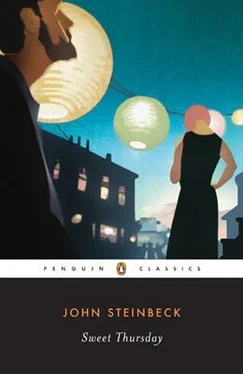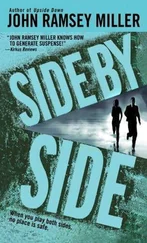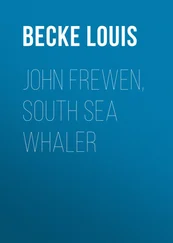John Steinbeck - Sweet Thursday
Здесь есть возможность читать онлайн «John Steinbeck - Sweet Thursday» весь текст электронной книги совершенно бесплатно (целиком полную версию без сокращений). В некоторых случаях можно слушать аудио, скачать через торрент в формате fb2 и присутствует краткое содержание. Год выпуска: 2008, ISBN: 2008, Издательство: Penguin Classics, Жанр: Классическая проза, на английском языке. Описание произведения, (предисловие) а так же отзывы посетителей доступны на портале библиотеки ЛибКат.
- Название:Sweet Thursday
- Автор:
- Издательство:Penguin Classics
- Жанр:
- Год:2008
- ISBN:1-4362-4126-X
- Рейтинг книги:5 / 5. Голосов: 1
-
Избранное:Добавить в избранное
- Отзывы:
-
Ваша оценка:
- 100
- 1
- 2
- 3
- 4
- 5
Sweet Thursday: краткое содержание, описание и аннотация
Предлагаем к чтению аннотацию, описание, краткое содержание или предисловие (зависит от того, что написал сам автор книги «Sweet Thursday»). Если вы не нашли необходимую информацию о книге — напишите в комментариях, мы постараемся отыскать её.
Cannery Row
Sweet Thursday — читать онлайн бесплатно полную книгу (весь текст) целиком
Ниже представлен текст книги, разбитый по страницам. Система сохранения места последней прочитанной страницы, позволяет с удобством читать онлайн бесплатно книгу «Sweet Thursday», без необходимости каждый раз заново искать на чём Вы остановились. Поставьте закладку, и сможете в любой момент перейти на страницу, на которой закончили чтение.
Интервал:
Закладка:
97
Salinas Rodeo: The California Rodeo has taken place each summer at the Salinas Rodeo Grounds since 1911.
98
Life: In 1936, under new owner Henry Luce, Life (which began in 1883 as a humor magazine) became the first all-photography news-magazine in the United States. At its most popular, it sold more than thirteen million copies per week. It published a regular feature, “ Life Goes to a Party.”
99
the picture: Snow White and the Seven Dwarfs, a 1937 Walt Disney Productions movie, was the first animated film made in Technicolor.
100
O Frabjous Day!: From Lewis Carroll’s nonsense poem “Jabberwocky,” which appears in chapter one of Through the Looking-Glass and What Alice Found There (1871): “ ‘And, hast thou slain the Jabberwock? / Come to my arms, my beamish boy! / O frabjous day! Callooh! Callay!’ / He chortled in his joy.”
101
Dementia praecox: Any of several psychotic disorders, such as schizophrenia, characterized by distortions of reality, disturbances of thought and language, and withdrawal from social contact.
102
Where Alfred the Sacred River Ran: Parody of “…Where Alph, the sacred river, ran / Through caverns measureless to man…” from “Kubla Khan or, a Vision in a Dream: A Fragment” (1816), a poem by British Romantic poet Samuel Taylor Coleridge (1772–1834).
103
1914 Willys-Knight: Willys-Knight automobiles were produced between 1914 and 1933 by Willys-Overland Company of Elyria and Toledo, Ohio. In an internal combustion engine, ring gear and pinions connect the car’s starter with the motor’s flywheel.
104
“A veritable fairyland”: According to Susan Shillinglaw in A Journey into Steinbeck’s California (2006), Steinbeck’s portrayal of the culminating costume party at the Palace Flop house may owe its inspiration to an outrageous benefit party, “Surrealistic Night in an Enchanted Forest,” thrown by artist Salvador Dalí at Monterey’s Hotel Del Monte on September 2, 1941 (pp. 76–77). See also the short film clip, “Dizzy Dali Dinner,” on YouTube at http://www.youtube.com/watch?v=vg6i4E0Woak.
105
“Whistle While You Work”: Song featured in Walt Disney’s animated movie Snow White and the Seven Dwarfs (1937), with music by Frank Churchill (1901–42) and lyrics by Larry Morey.
106
threshold of a great career: Old Jingleballicks echoes Ralph Waldo Emerson’s salutation to Walt Whitman, after the philosopher had read the first edition of the younger man’s Leaves of Grass (1855): “I greet you at the beginning of a great career,” he wrote Whitman on July 21, 1855.
107
Knight Templar’s hat: The Knights Templar is a Christian-oriented organization founded in the eleventh century. Originally, the Knights Templar were laymen who protected and defended Christians traveling to Jerusalem. These men took vows of poverty, chastity, and obedience, and were renowned for their fierceness and courage in battle. All Knights Templar are members of the world’s oldest fraternal organization, known as “The Ancient Free and Accepted Masons” or, more commonly, “Masons.” The hat Steinbeck refers to is plumed.
108
“Wedding March”… Lohengrin: The Bridal Chorus from Richard Wagner’s romantic opera Lohengrin (1850). Traditionally played at weddings, it is commonly known as “Here Comes the Bride.”
109
Oh, Woe, Woe, Woe!: From American Modernist expatriate poet Ezra Pound’s parodic “Song in the Manner of House man,” which appeared in his fifth collection, Canzoni (1911). The final stanza reads, “London is a woeful place, / Shropshire is much pleasanter. / Then let us smile a little space / Upon fond nature’s morbid grace. / Oh, Woe, woe, woe, etcetera… ”
110
Mr. and Mrs. Sam Malloy: In chapter 8 of Cannery Row, the Malloys take up residence in this cast-off cannery boiler.
111
if the British impressed our sailors: During the administrations of Washington, Adams, Jefferson, and Madison, the Royal Navy impressed thousands of seamen from American ships, claiming that they were British subjects. (The British refused to recognize American naturalization, and often disregarded protection documents issued to native-born American sailors.) American anger over impressment became one of the causes of the War of 1812.
112
“Fifty-four-Forty”: In 1844 James K. Polk was elected president on a platform calling for setting the northern boundary of Oregon at 54°40'N. The Anglo-American dispute over the boundary was settled in 1846 by a treaty setting the border at 49°N.
113
“My dear Anthony West…”: Steinbeck’s satire of Joe Elegant as a novelist continues here in this dig at Anthony West. The British author (1914–87)—novelist, essayist, biographer—published “California Moonshine,” an unflattering review of Steinbeck’s East of Eden, in the September 20, 1952, issue of the New Yorker: “Mr. Steinbeck has written the precise equivalent of those nineteenth-century melodramas in which the villains could always be recognized because they waxed their mustaches and in which the conflict between good and evil operated like a well-run series of professional tennis matches” (p. 125). In a letter to Carlton Sheffield on October 15, 1952, in Steinbeck: A Life in Letters (1975), Steinbeck registered his dismay: “I am interested in Anthony West’s review in the New Yorker [ sic ]. I wonder what made him so angry—and it was a very angry piece. I should like to meet him to find out why he hated and feared this book so much” (p. 458). Clearly, Steinbeck had the last word.
114
Fafnir: In German composer Richard Wagner’s Norse-inspired epic of four linked operas, Der Ring das Nibelungen (its first complete production took place in 1876), Fafnir, a giant transformed into a dragon, guards the golden treasure.
115
James Petrillo: James Caesar Petrillo (1892–1984) was a labor leader who became the influential president of the American Federation of Musicians from 1940 to 1958. He rigorously policed the practice of hiring nonunion musicians, such as the members of Joseph and Mary Rivas’s band.
116
Hopkins Marine Station: The Hopkins Seaside Laboratory of Stanford University opened in 1892 on Lovers Point, north of its current site at 120 Oceanview Boulevard, Pacific Grove. It has been located on Oceanview since 1917, when it was officially renamed Hopkins Marine Station. It is the oldest marine research facility on the West Coast. Steinbeck attended summer classes at Hopkins in 1923.
117
“Memphis Blues”: A song written in 1909 (published in 1912) by songwriter and bandleader William Christopher Handy, self-proclaimed “Father of the Blues.” “Memphis Blues” played a significant role in bringing African American music into the mainstream.
118
Henny Penny: English fairy tale of undetermined origin and variable plot, sometimes called “The Sky Is Falling,” “Chicken Little,” “Chicken Licken,” or “Henny Penny.” In one version Henny Penny is hit on the head by a falling acorn and believes that “the sky is falling” and that she must tell the king. The moral of the tale varies from version to version but certainly can be interpreted to mean that danger is imminent.
Читать дальшеИнтервал:
Закладка:
Похожие книги на «Sweet Thursday»
Представляем Вашему вниманию похожие книги на «Sweet Thursday» списком для выбора. Мы отобрали схожую по названию и смыслу литературу в надежде предоставить читателям больше вариантов отыскать новые, интересные, ещё непрочитанные произведения.
Обсуждение, отзывы о книге «Sweet Thursday» и просто собственные мнения читателей. Оставьте ваши комментарии, напишите, что Вы думаете о произведении, его смысле или главных героях. Укажите что конкретно понравилось, а что нет, и почему Вы так считаете.










